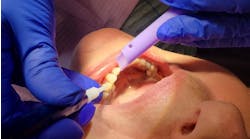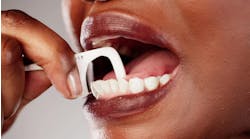3 ways to avoid compromised patient care in the operatory
When we graduate from dental hygiene school and enter the “real world,” we notice that standards of care in school can be different than office standards. It is important to keep your integrity throughout your career, in spite of tight schedules. Here are three simple ways to not compromise patient care and the dental hygiene license you worked so hard for.
Don’t skimp on medical history
Have you ever started treatment only to find out halfway through your patinet just had a joint replacement two months ago? Or have you ever had a patient tell you she has never been premedicated for an appointment, but when you refer to the health history, you discover indeed they premedicate before every appointment?
It's important to refer back to the last patient notes and compare it with the medical history provided. We all make mistakes. And we all know from our days back in the hygiene school clinic, the first information that is gathered and/or discussed prior to starting treatment is the patient’s health history. We need to be diligent in reviewing our patient's medical history prior to starting treatment in order to prevent undue harm. And with all the information about the oral-systemic link, we know what key changes to look for that might be indicating a decline in our patients’ oral health.
Those at higher risk for oral changes are our patients who are diabetic or pregnant, and those who have heart disease, autoimmune diseases, or cancer. One practical application is to have your patient reach out to his or her surgeon’s office and get a letter stating guidelines for premedication. You can also help your patients by contacting his or her orthopedic surgeon on the patient’s behalf and have that practice fax over a letter on the same day. A little courtesy goes a long way.
Listen to your patient’s chief concerns
Listen to your patients’ main concerns when they walk through the operatory door. Patients usually have to wait few weeks or sometimes months to get in to see us. They are dying to ask questions about their concerns and explain their chief complaints. If we fail to listen to our patients, they could lose trust in us as oral health-care providers. For example, when we are preheating our doctors before the patient exam, we may fail to mention the key component about which our patient is concerned. And it's possible there is so much going on that takes precedence in their care that we just downright forget about their concerns. How does that make the patient feel when they walk out of our opteratory or office and get into their cars to drive home only to realize their main concern was never discussed with them at all? This makes them feel frustrated or disappointed in the care they just recieved. It could be as simple as an interest in whitening or the straightening of their teeth. If we are not careful, we could totally miss opportunities to serve our patients.
PPE and OSHA: Protect yourself and your patient
New grads and fellow hygienists, do not become lax in your use of personal protective equipment (PPE). You could compromise yourself and put your patients at risk too. Handwashing before donning gloves is not optional. You would be amazed at what washing your hands does for patient confidence in the clinician. Another way to build patient confidence is to wear and change your mask properly—not under the chin or around your elbow, as if you are saving it for the next patient. Leaving a mask on the counter only contaminates the surface for the next patient. Masks, like gloves, are single use.
Proper eyewear is also vital to both clinician and patient. Have your ever seen prophy paste splatter right into a patient's eye? You sure don’t want that experience, and may not be returning to your chair after that. It’s not a great way to gain patient trust.
Do you know your office policy if you or a patient has been involved in a injury or incident relating to bloodborne pathogens? It's important you know your safety regulations and protocol. OSHA should be reviewed and policies updated annually. You can work with your office OSHA coordinator on policies in place in the event of an incident before you find yourself in the middle of one. That way you can make sure the incident is properly handled for your protection, as well as the patients’. If the your office where you are currently working does not have an appointed OSHA coordinator, consider taking on that role. Do not compromise patient care in the chair.
Conclusion
We are responsible for what goes on in our operatory. The patient’s well-being should always be our number one priority in the operatory. Practice does make perfect. We are all human and work with other humans.Yes, mistakes can happen. Work together with your office team to create policies to keep your patients safe. I hope this encourages you to not overlook simple details that can prevent us from compromising patient care.
Katie Leiva, RDH, has been a practicing dental hygienist for 10 years, with nearly 14 years of experience working in the dental field. She has spent majority of her career in general private practice and has worked in periodontic and pediatric settings. She currently works full-time in a corporate dental settings. Katie is passionate about breastfeeding and speaks to breastfeeding groups about the oral cavity development through breastfeeding, and is currently pursuing a bachelor of science in oral health promotion.






